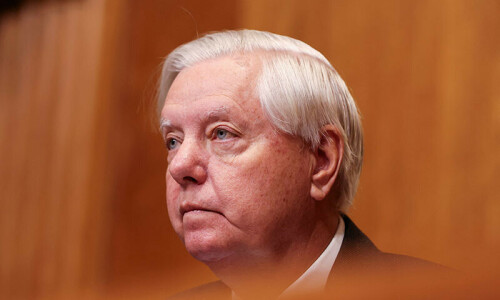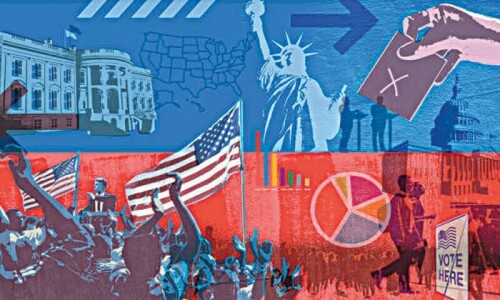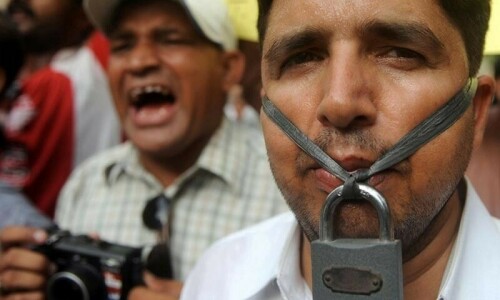THE process of democratisation in India started with the legislation of the Government of India Act 1935 based on the past political and constitutional developments, which enabled the colonial masters to engage major political stakeholders in electoral politics. The Act passed by the British parliament was to promote democratic system in India and to engage people in the political process. Subsequent rule over India by the Indian National Congress (INC) through elections held in 1937 exposed its drama of democracy that fizzled out during its cruel rule as it failed to protect the legitimate interests of major communities.
Congress’s exploitation of the Muslim community proved the first blow to the British task of holding India together and Congress’s policy inimical to Muslim interests made the work of Muslim leaders a little easier in keeping the Muslim masses aware of hostile attitudes of Congress. Nevertheless, unsatisfactory performance of All-India Muslim League (AIML) in elections also posed a great challenge for Muslims to justify their political existence. Thus, Quaid-i-Azam Muhammad Ali Jinnah reorganised the AIML and demonstrated his unwavering commitment to the task. His leadership style owed its origin to his unflinching belief in unity and political empowerment of Muslims. Jinnah converted the party into a mass movement and generated unprecedented change in Muslim thinking and attitudes. He created unity among discordant factions of the party. Under his leadership AIML passed the Lahore Resolution on March 23, 1940 which transformed the political outlook of the Muslim community of undivided India.
The resolution was enriched with the vision of Jinnah. The essence of his famed 14-point charter and representation of Two-Nation theory codified the genuine rights of Muslims and orchestrated demand for a separate homeland. The Lahore Resolution generated new enthusiasm among Muslims and showed a clear path leading towards their final destiny and created hope among them during the times of adversity marked by political uncertainty, nervousness and fear among people triggered by the Second World War (1939-45).
Congress was largely responsible for wrecking the Cabinet Mission Plan
1945 elections
This resolution increased further the power of well-knit AIML to achieve legitimacy after winning elections which were fought by AIML on the issue of Pakistan versus United India. The results of the Central Legislative Assembly elections were declared by the end of 1945, which clearly indicated the huge success of Muslim League by winning every Muslim seat. Muslims polled 86.6 per cent of the votes cast in Muslim constituencies. AIML also emerged as the sole representative party of Muslims under the provincial elections. This increased the credibility and popularity of AIML, and its demand for a sovereign state was now fully justified on democratic and legal grounds.
In the wake of World War II, the situation in India had destabilised due to food insecurity, unemployment, poverty, hatred and violence caused by Hindu-Muslim tensions. Nevertheless, under these circumstances, results of national elections in United Kingdom triggered political change. A new government was formed by the Labour Party. Lord Pethick-Lawrence replaced L.S. Amery as Secretary of State for India. British intentions of handing over power to Indians through formation of an interim government were made clear. Congress politics was revolving around the single point that the British must transfer absolute power to Congress, ignoring the fact that it was not representative of entire India. Congress leaders tried to provoke conflict and posed threat to peaceful settlement and transfer of power. However, the British understood the consequences of leaving all other communities at the mercy of Congress.
‘Explosive urgency’
In the beginning of 1946, the government decided to send a group of parliamentarians to visit British India to acquaint themselves with firsthand knowledge of political conditions of India. S.M. Burke and S. Quraishi in their book The British Raj in India mention Mrs. Nichol as one of the delegates who began to feel that the idea of Pakistan must be conceded. R.W. Sorensen also considered the Indian situation as one of “almost explosive urgency.”
On February 19, 1946, the secretary of state announced in the House of Lords that it had been decided by the government to send a mission of three ministers to negotiate with political leadership to devise a constitutional set-up and to solve Hindu-Muslim conflict. Just a couple of days before the formal announcement was made by the prime minister regarding Cabinet Mission’s visit to India, Jawaharlal Nehru made frantic attempts to influence the outcome of the Mission in his party’s favour by adopting threatening posture that “if the British Cabinet Mission fails to solve the pressing problems which clamour for solution, a political earthquake of devastating intensity will sweep the entire country.”
The Quaid-i-Azam responded to the British in a decent manner. The analysis of contents and evidence accumulated through official correspondence of Jinnah with prime ministers, ministers, viceroys, secretaries of state and other British officials indicates acumen, political wisdom, and strong determination to protect the rights of Muslims and to advance the Muslim cause through dialogue based on factors including historical legacy, geographical logic, and constitutional conventions as well as legal procedures. Jinnah’s realistic thinking reflecting on Congress’s anti-Muslim policy and his apprehensions about INC’s aggressive line of action was proved and later confirmed by the British as they reached the same conclusion Jinnah had reached about Congress. Jinnah was hopeful that the Cabinet delegation will realise that partition of India into Pakistan and Hindustan would be the only constitutional solution to the Indian problem.
Jinnah knew that the British were no longer in a position to extend their further stay in India and after the return of the British from India Congress would “seize power and establish Caste-Hindu domination over all communities.” He shared his apprehension with Prime Minister Clement Atlee through a letter on July 23, 1946. Jinnah suggested that the members of the Cabinet Mission should keep themselves away from playing into the hands of the Congress and should not be afraid of threats including non-cooperation and civil disobedience posed by the INC. Jinnah exposed the real face of Congress and argued that since its inception in 1885, the Congress had “adopted the aggressive and dictatorial attitude, pistol in their hand.”
Congress strikes
Thus, the Congress interpreted the Cabinet delegation’s ideas according to their own wishes to suppress Muslims. In response to the letter of Lord Wavell on July 23, 1946, Jawaharlal Nehru, the INC president, showed his unwillingness to accept the proposals and refused to cooperate with the British unless the powers of the Provincial Interim Government were redefined to reflect Congress’ whims and wishes and their interpretation of “independence in action” was fully accepted.
This meant that Congress was not going to accept the British interpretation of Cabinet proposal about the grouping of provinces. The clarification of the term ‘independence in action’ was sought by Lord Wavell through telegram to Lord Pethick-Lawrence. Further, he was asking whether Nehru proposed that the governor-general could repudiate his responsibilities to protect minorities. Nehru opposed the governor-general’s power to select the representatives of minorities and he meant by his self-created term “independence in action” as the independent working of provincial governments without having power to opt out of the central government.
Under these changing circumstances, Jinnah as unchallenged Muslim leader made clear to the British through his personal letter: “I therefore trust that the British Government will still avoid compelling the Muslims to shed their blood, for, your surrender to the Congress at the sacrifice of the Muslims can only result in that direction. If power politics are going to be the deciding factor, in total disregard for fair play and justice, we shall have no other course open to us except to forge our sanctions to meet the situation which, in that case, is bound to arise. Its consequences, I need not to say, will be most disastrous and a peaceful settlement will then become impossible.”
In response to this letter Mr Atlee appreciated the real contribution of AIML under Jinnah’s leadership to settle the issues and he appealed to Jinnah to assist the viceroy in formation of interim government joined by two mainstream parties after resolving matters through argument and compromise to produce a constitution to satisfy their natural aspirations.
Further, Wavell in his response to Lord Pethick-Lawrence corroborates the sagacious view of Jinnah that “Congress domination would lead to chaos in India and he suggested that His Majesty’s Government should be ready to accept challenge of dealing with Congress without surrendering its authority and handing over Muslim and other communities to unchecked domination of Congress.”
The delegation put forward their own proposals on May 16, 1946 after their failure to develop consensus among all political leaders, which provided for Union of India with executive and legislature consisting of representatives belonging to provinces and states and contemplated a constitution under which the central government was empowered to deal only with defence, foreign affairs, and communication. The central government was also empowered to exercise all powers to raise finances to perform the above functions. The Cabinet Mission plan envisaged the creation of three autonomous groups of provinces. Group A consisted of Hindu-majority provinces, Group B comprised of Muslim-majority provinces including Sindh, Punjab, NWFP and Baluchistan. Group C included Assam and Bengal. Each group was empowered to frame constitution for provinces belonging to it. The Cabinet plan brought back the same concept of unity of India introduced by Sir Stafford Cripps in 1942 and apparently it did not accept the demand of Muslims for creation of a separate state as envisaged in the Lahore Resolution.
Jinnah’s masterly grasp over ground realities enabled him to outflank the politics of Congress. Jinnah as a consummate statesman was able to clearly see the reflection of his Two-Nation theory in the form of grouping of provinces. Further the main purpose of the Cabinet delegation was to negotiate with political leaders and reconcile the differences of opinions among politicians and among themselves. Thus, the three-member mission did not come with powers to take decisions. Nevertheless, the mission was able to gauge the political temperature and it was in position to guide His Majesty’s Government about atmosphere of distrust in colonial India and to create understanding of the fact that the Indian situation required solutions instead of negotiations. Nearly a year after the return of the Cabinet delegation, Lord Mountbatten came with all powers to deal with the Indian problem. Jinnah told him clearly that Congress was obsessed with the idea of smashing Muslim League’s all-out determination to secure Muslim identity and interests, and it was clear that the central government proposed under the Cabinet Mission would be controlled by its majority vote. Thus, Jinnah’s stance for creation of an independent Muslim state remained unalterable.
The dilution of the Cabinet plan, however, created a way forward for the consideration of the partition as the only option agreed by all communities. Mountbatten’s viceroyalty was responsible to finish the work of partition before the deadlines set by the British government. After the announcement of June 3 1947 plan, the power was transferred to two Dominions of Pakistan and India in a brief span of 72 days. Unlike India, Pakistan faced enormous challenge of setting new administration, establishing new institutions, developing infrastructure of the new capital in addition to post-partition injustice in sharing military assets, cash balances, displacement and migration of people and water issues.
The unjust partition plan also left the Kashmir conflict unresolved which further escalated tension and posed threat to the newly born country. Things were deliberately made difficult for Pakistan to survive economically. The burning desire of Indian leaders to make Pakistan desperate for rejoining India remained unfulfilled, as the country under Jinnah’s leadership began to rise in the face of hostile adversaries and progressed.
Jinnah knew the power of reason and argument, thus his demand for the creation of a separate homeland was based on nationhood, which he defined so eloquently that neither Congress nor the British could refute its unassailable logic. H.V. Hodson in The Great Divide mentions Lord Mountbatten saying that during his first talk with Mr Jinnah he discovered that “Jinnah was the man who held the key to the whole situation.” The British recognised Jinnah as a pleader of high calibre, and he was almost always right when it came to arguments about legal and constitutional matters.
The creation of a new country for Muslims was the result of Jinnah’s pleading of convincing argument, brilliant strategy and willpower he demonstrated through his leadership skills, unflappability, commitment, and dedication to the cause of the Muslims masses.
The writer is Professor and Director, Pakistan Study Centre, University of Sindh, Jamshoro.
Email: shuja.mahesar@usindh.edu.pk

















































Dear visitor, the comments section is undergoing an overhaul and will return soon.